Your talking points for the 2020 race, in time for Thanksgiving dinner
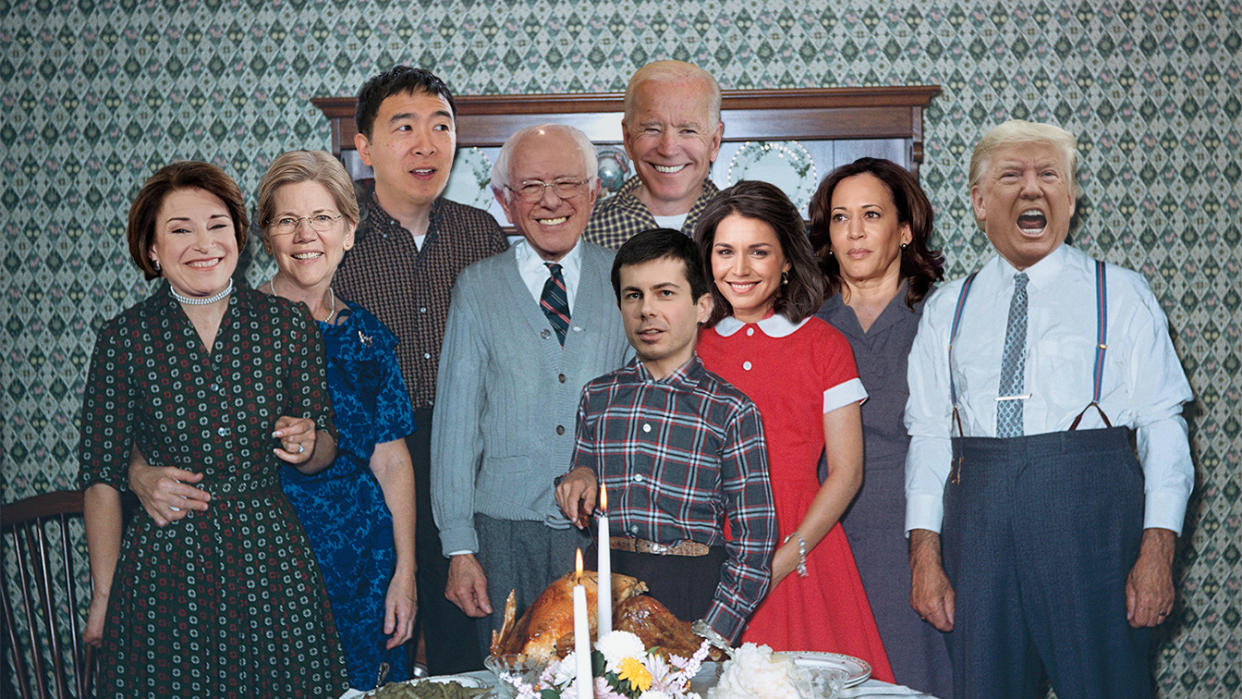
Welcome to 2020 Vision, the Yahoo News column covering the presidential race with one key takeaway every weekday and a wrap-up each weekend. Reminder: There are 68 days until the Iowa caucuses and 342 days until the 2020 election.
We all know we’re not supposed to talk politics at Thanksgiving. But with impeachment looming and a momentous presidential election year about to commence, the subject will probably be harder than ever to avoid on Thursday. That’s why 2020 Vision has prepared this handy cheat sheet: a guide to where things stand with President Trump and all 18 of the Democrats running to replace him. We’ve ranked each candidate by their odds of winning, as calculated by PredictIt.com. We’ve provided the latest polling numbers. We’ve anticipated the key questions you might hear — or want to ask — over the table. And with the goal of avoiding food fights and helping you sound like the voice of reason, we’ve even given you the facts you need to respond.
Donald Trump
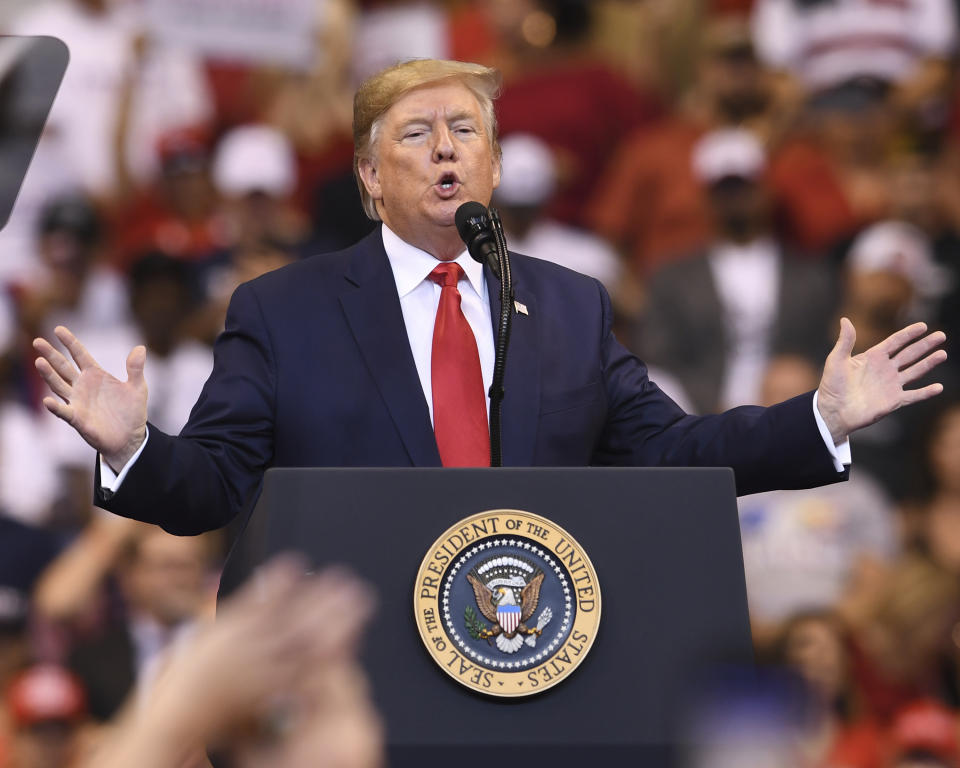
Odds of winning reelection: 2 to 1
Average approval rating: 41.7 percent
Average disapproval rating: 53.6 percent
_____
Questions you might hear: Is he going to be impeached? Removed from office? What happens then? And is he really the favorite to win reelection?
How to respond: Trump will almost certainly be impeached by the Democratic House and almost certainly acquitted by the Republican Senate, where removal would require the votes of 20 GOP senators — an exceedingly high hurdle with public opinion still bitterly divided over impeachment and Trump’s (admittedly weak) approval rating basically unchanged after weeks of depositions and public hearings. Unless some new revelation upends this dynamic, expect the impeachment process to end in January; Trump to appear on the ballot next November; and partisans on both sides to be more fired up than ever to vote for or against him. As for Trump’s chances of winning reelection, he trails all of the leading Democrats nationally in head-to-head matchups — but he remains strong in the Electoral College battlegrounds that matter most.
Joe Biden

Odds of winning the nomination: 4 to 1
National polling average: 28.2 percent (1st place)
Iowa polling average: 16.3 percent (4th place)
_____
Question you might hear: Isn’t he toast?
How to respond: The reports of Biden’s political death have been greatly exaggerated. Despite constant media reports about his missteps on touchy racial questions and his middling debate performances, the former vice president has led in the national polling average for all of 2019, with the exception of one day in early October when Elizabeth Warren overtook him. His support has never fallen below 26 percent. Yes, he is struggling in Iowa and New Hampshire, where voters are paying closer attention to the contest than elsewhere. But he remains strong in South Carolina, Nevada and across the Super Tuesday states, and no one has been able to dent his massive lead among black voters, who play an outsized role in picking the Democratic nominee. If the anti-Biden vote remains evenly divided among Warren, Pete Buttigieg and Bernie Sanders, Biden could arrive in Milwaukee for next summer’s nominating convention with the lion’s share of delegates.
Pete Buttigieg
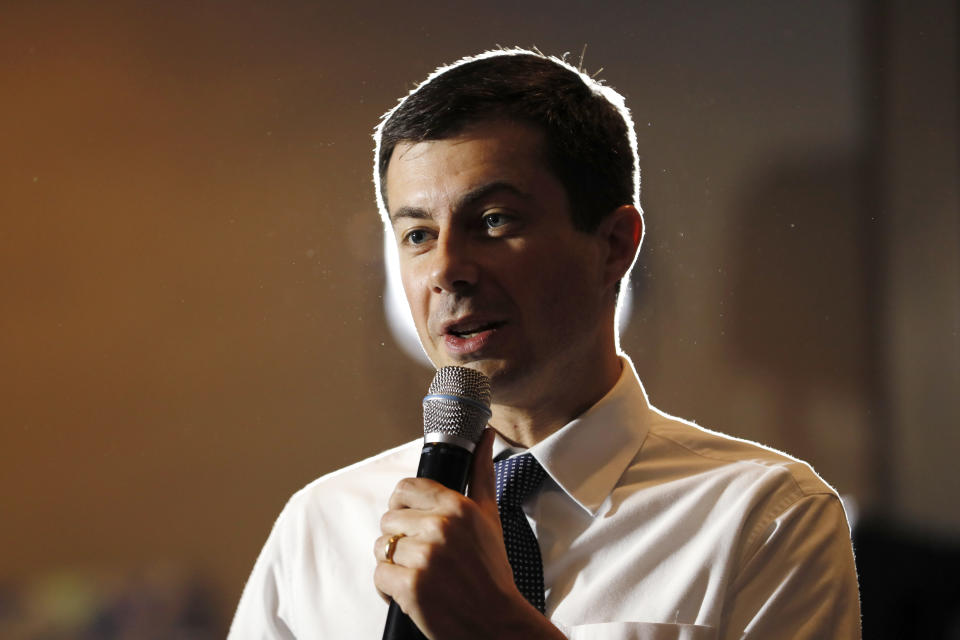
Odds of winning the nomination: 5 to 1
National polling average: 10.5 percent (4th)
Iowa polling average: 24 percent (1st)
_____
Question you might hear: Is America ready for a gay president?
How to respond: Maybe — but Democrats will first have to decide if they’re ready for a gay nominee. The polling is clear: According to a recent Politico/Morning Consult poll of registered voters, 50 percent of respondents said they were either definitely or probably ready to have a commander in chief who is openly gay, compared with 37 percent who said they were either definitely or probably not ready. But voters were more pessimistic when asked whether they thought their neighbors were ready: only a quarter said yes, while 46 percent said probably or definitely not. As anxious Democrats seek a last-minute Goldilocks candidate — sharper and less status quo than Biden but more moderate and palatable than Warren or Sanders — Buttigieg has been soaring in the polls, vaulting to first overall in Iowa and second nationally in the latest survey from Quinnipiac. But questions remain about whether the South Bend, Ind., mayor can connect with black voters, who have been notably cool toward his candidacy, and he will soon face the same sort of scrutiny about his electability that Warren has struggled to overcome in recent weeks. His sexuality will play a part in that conversation.
[Also read: Can young black voters save Mayor Pete?]
Elizabeth Warren

Odds of winning the nomination: 6 to 1
National polling average: 16.7 percent (3rd)
Iowa polling average: 17.7 percent (3rd)
_____
Question you might hear: Is she too far left to beat Trump?
How to respond: No one knows, but many Democrats are plainly worried. In early October, the Massachusetts senator briefly overtook Biden in the national polling average. She led in Iowa for nearly two months, from last September to mid-November. But amid attacks from her Democratic rivals over her support for Medicare for All — a proxy fight for the question of whether her brand of “big, structural change” would put Dems at a disadvantage next November — Warren’s numbers began to trend downward, and today she has fallen to third place both nationally and in Iowa. The latest Quinnipiac poll sends a clear signal: In mid-October, 40 percent thought she had the “best policy ideas”; today, that number is 23 percent, with most of her losses coming from moderates and independents. Not helping matters: a New York Times/Siena College survey showing Biden ahead of Trump in the battleground states — and Warren behind. There’s time for a comeback before Iowa, but Warren has her work cut out for her.
Bernie Sanders

Odds of winning the nomination: 6 to 1
National polling average: 17.8 percent (2nd)
Iowa polling average: 18.3 percent (2nd)
_____
Question you might hear: Is Bernie really back?
How to respond: Sure. The guy is 78 years old. In early October, he had a heart attack. Two weeks later he was on the debate stage. Then he held the biggest rally of the cycle in Queens. Now he has overtaken his fellow progressive Warren in Iowa, New Hampshire and nationally. Not bad for a candidate the pundits were ready to write off. That said, Sanders hasn’t cleared 20 percent nationally since April, and while his ride-or-die base is sticking with him, he hasn’t been converting new supporters to his “political revolution.” Sanders’s best bet is a weakened Warren and a top tier that remains divided, allowing him to steadily amass delegates and sweep into the convention as the leader of the party’s left wing.
Michael Bloomberg

Odds of winning the nomination: 10 to 1
National polling average: 2.4 percent (7th)
Iowa polling average: 1.5 percent (11th)
_____
Question you might hear: Can he really buy the nomination?
How to respond: We’ll see. Since the start of the modern primary system in 1976, no eventual nominee has launched a campaign any later than August of the year before the election. Bloomberg announced in late November. But Bloomberg is a plutocrat — the eighth-richest person in America, with a net worth of $53.4 billion — at a time of rising populism and a fiscal conservative at a moment when neither party seems to care about debt and deficits. That means Bloomberg’s candidacy will be the clearest test in American history of how much cold, hard cash can accomplish, and how many obvious political obstacles it can overcome. Bloomberg has already spent or pledged to spend $150 million: more than twice what Sanders, the field’s leading fundraiser, has raked in so far over the entire 2020 cycle. Meanwhile, his opening TV ad buy — a record-breaking $37 million purchase that will put 60-second biographical commercials on the air for a full week in more than two dozen states and roughly 100 media markets from California to Maine — is more than all of Bloomberg’s Democratic rivals, not counting his fellow billionaire Tom Steyer, have spent on TV ads this year. Those are unprecedented sums. The question now is whether Democrats will buy what Bloomberg is selling.
Andrew Yang
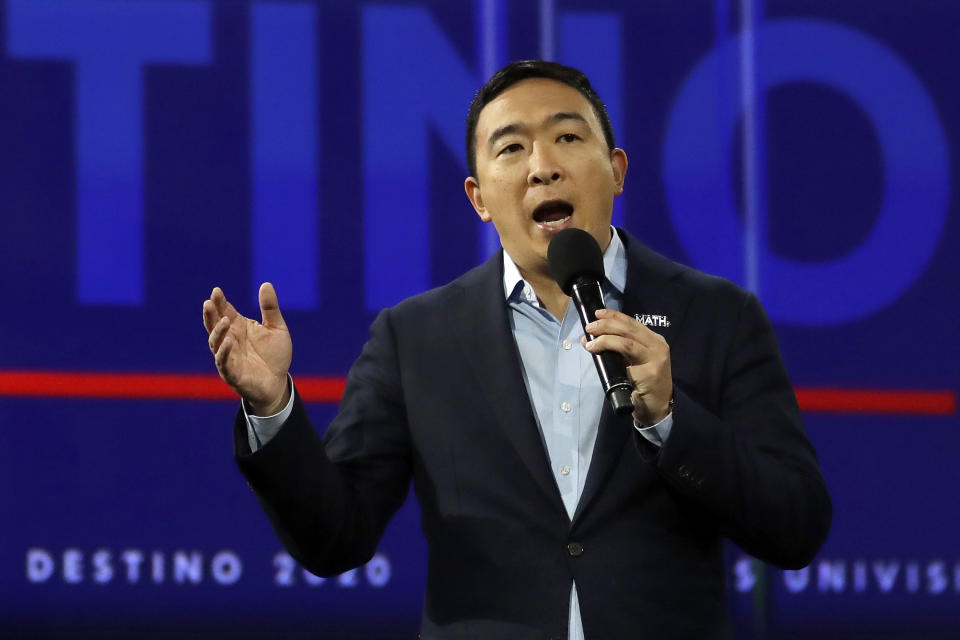
Odds of winning the nomination: 14 to 1
National polling average: 3.2 percent (6th)
Iowa polling average: 2.7 percent (7th)
_____
Question you might hear: Yang’s in some sort of gang, right?
How to respond: Yes and no. The “Yang Gang,” as some of his supporters call themselves, have helped propel his unlikely candidacy, especially online. And they are quick to lash out when they believe the media is displaying bias against him, for example, during the MSNBC-hosted Democratic debate earlier this month, when Yang was ignored for the first half hour and asked just five questions in total. The entrepreneur accused MSNBC of “systematic bias,” and the Yang Gang got the hashtag “#BoycottMSNBC” trending on Twitter.
Tulsi Gabbard
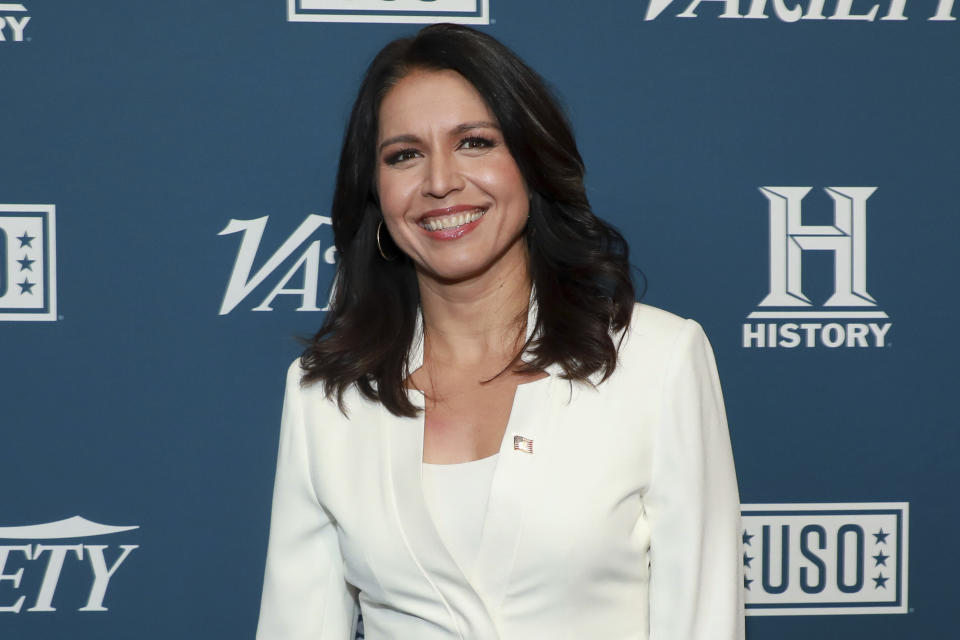
Odds of winning the nomination: 33 to 1
National polling average: 1.5 percent (11th)
Iowa polling average: 1.7 percent (9th)
_____
Question you might hear: Isn’t she a Russian operative?
How to respond: No. Or at least there’s no real evidence of it, notwithstanding remarks by Hillary Clinton suggesting in a recent interview that she believed Republicans were “grooming” Gabbard to be a spoiler as a third-party candidate. Clinton, who did not mention Gabbard by name, implied that the Hawaii Democrat with some idiosyncratic foreign-policy positions, is “the favorite of the Russians.” Gabbard has used the controversy to stir interest in her campaign, which has gained some support in New Hampshire. But as a candidate who seems more intent on trolling her party than leading it, she has almost no chance of actually winning the nomination.
Kamala Harris

Odds of winning the nomination: 33 to 1
National polling average: 3.8 percent (5th)
Iowa polling average: 3.3 percent (6th)
_____
Question you might hear: Whatever happened to the whole “female Obama” thing?
How to respond: Harris has proven to be the biggest flop of the 2020 primary contest. A charismatic campaigner and widely-touted rising Democratic prospect, the freshman California senator debuted in Oakland with the biggest announcement rally of 2019. She shined in the first round of debates and skyrocketed to 15 percent in the national polls as a result. And then began her long, steady decline, which culminated this fall with mass staff layoffs and a last-ditch admission that she was “moving to Iowa.” Harris still registers in the polls, but just barely. In her stump speech, she blames her troubles on voters’ concerns about the “electability” of an African-American woman, and she may be partially correct. But she’s also run a rudderless campaign and squandered much of the goodwill that greeted her entrance into the race. At this point, Harris may be hoping to be tapped as a running mate by the eventual nominee, who based on current polling will most likely be a white man.
Amy Klobuchar

Odds of winning the nomination: 50 to 1
National polling average: 2 percent (8th)
Iowa polling average: 5.3 percent (5th)
_____
Question you might hear: Is she “peaking” at “just the right time?”
How to respond: At least that’s what supporters of the Minnesota senator argued in a New York Times story Tuesday. “Her energy is coming at just the right time,” Klobucher’s team told the Times — “long enough before the Iowa caucuses to allow Ms. Klobuchar to expand her operation but not so early that their momentum is gone by early February, when caucusing and voting begins.” Perhaps. After two standout debate performances — the second of which earned her a Rachel Dratch spoof on on “Saturday Night Live” — Klobuchar’s fundraising and polling numbers have ticked up. But in Iowa, which borders on her home state, she’s still 10 percentage points under the 15-percent “viability” threshold for picking up delegates, and she’ll have to get past today’s trendier Midwestern moderate (Buttigieg) in order to actually capitalize on her rising profile.
Deval Patrick

Odds of winning the nomination: 50 to 1
National polling average: 0.3 percent (15th)
Iowa polling average: n/a
_____
Question you might hear: Isn’t it too late to jump in?
How to respond: Possibly. Most voters likely had never heard of the former Massachusetts governor when he made the late jump into the race. That was evident last week when he canceled a campaign event at Morehouse College after just two people showed up. Patrick, for his part, laughed it off. “This was going to be hard no matter what,” he said on CNN, adding: “There’s still space for what I offer.” That would be “building bridges” between the “ambitious goals” at both ends of the Democratic party.
[Yahoo “360”: Politics and the holidays: Speak out or shut up?]
Tom Steyer

Odds of winning the nomination: 100 to 1
National polling average: 1.7 percent (9th)
Iowa polling average: 2.3 percent (8th)
_____
Question you might hear: “Remind me which billionaire he is?”
How to respond: Steyer is the California activist and philanthropist behind the “Need to Impeach” campaign. A late entrant, he has qualified for several debates after committing to drop $100 million of his own money on the race, though critics say that cash would be better spent supporting the eventual Democratic nominee — and chances are it won’t be Steyer. But hey, he was portrayed by Will Ferrell on NBC’s “Saturday Night Live.” Money well spent?
Cory Booker
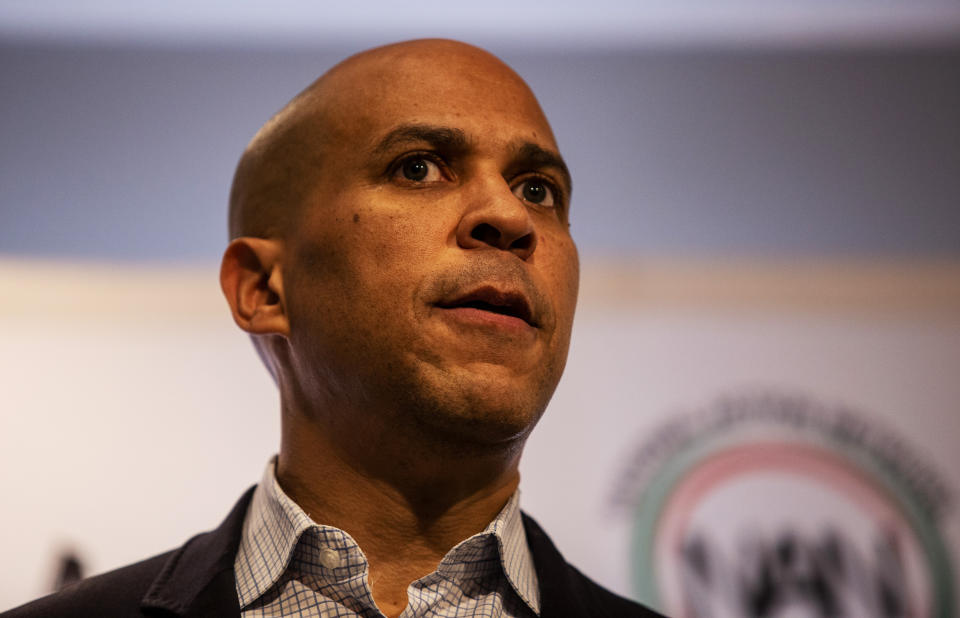
Odds of winning the nomination: 100 to 1
National polling average: 1.7 percent (9th)
Iowa polling average: 1.7 percent (9th)
_____
Question you might hear: Is he about to drop out?
How to respond: Unclear. In September, Booker’s campaign manager sent an ominous memo to supporters warning that if the campaign did not raise $1.7 million in 10 days, the candidate might be forced to drop out of the race. Booker’s supporters came through, and the New Jersey senator qualified for subsequent debates. But Booker still hasn't generated the 4 percent support in four Democratic National Committee-endorsed polls needed to make the debate stage in December. His campaign is now embarking on an all-out advertising blitz ahead of the DNC’s Dec. 12 deadline. Will it be enough? It remains to be seen, but even if he misses out, Booker said on CNN that his campaign has “all these ingredients necessary for an upset in Iowa.”
Julián Castro

Odds of winning the nomination: 100 to 1
National polling average: 1 percent (12th)
Iowa polling average: 0.7 percent (12th)
_____
Question you might hear: Would Castro be a good VP candidate?
How to respond: He would, perhaps better than one for the top of the ticket, if his latest fundraising pitch is any indication. Like Booker, Castro has had trouble raising money. Last month, Castro sent a plea to supporters warning them he needed to raise $800,000 or he’d be forced to drop his presidential bid. A few weeks after hitting that goal, his campaign sent another, with a misleading subject line disguising it as a flight alert, saying “unless our fundraising picks up, it doesn't look like we will be able to get Julián to Los Angeles for the December debates.”
Marianne Williamson

Odds of winning the nomination: n/a
National polling average: n/a
Iowa polling average: 0.3 percent (15th)
_____
Question you might hear: Does she really believe in crystals?
How to respond: No, and she’d like it if you stopped perpetuating that notion. “This idea that I’m a crystal woo-woo lady ... the crystal woo-woo lady image, to some extent amusing, has no relation to reality,” Williamson said in an interview with Yahoo News last month. “I’ve never had a crystal, I’ve never written about crystals. I’ve never talked about crystals. I’ve never had a crystal onstage with me.”
Michael Bennet
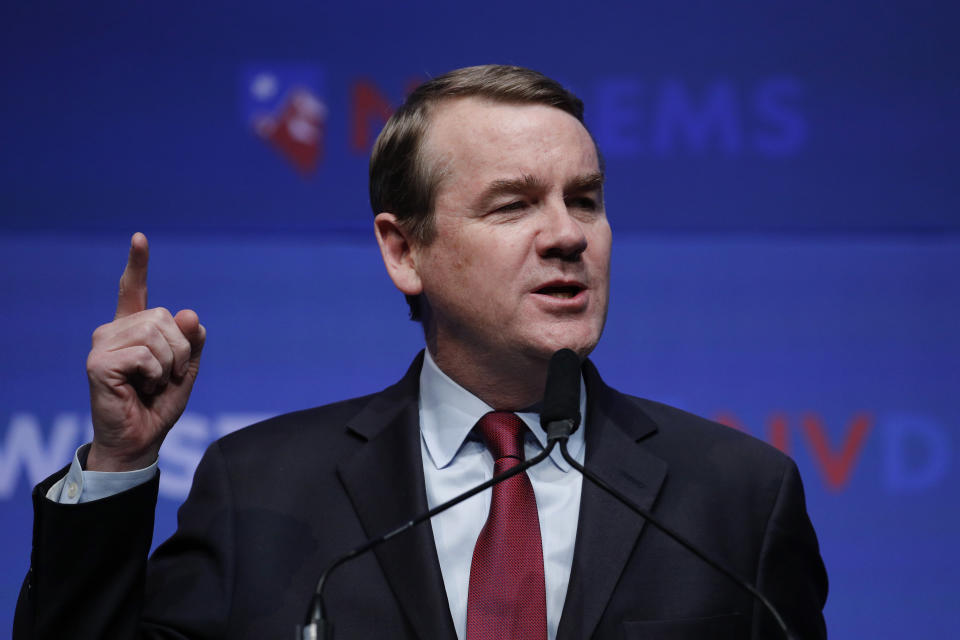
Odds of winning the nomination: n/a
National polling average: 0.8 percent (13th)
Iowa polling average: 0.7 percent (13th)
_____
Question you might hear: Is he the guy from Montana?
How to respond: No, but not too far off. To be fair, the Colorado senator has failed to break through in a crowded field that now features fewer virtually unknown middle-aged white men than it once did — but still far too many for voters to keep track of.
Steve Bullock

Odds of winning the nomination: n/a
National polling average: 0.4 percent (14th)
Iowa polling average: 0.7 percent (13th)
_____
Question you might hear: He’s the one from Colorado, right?
How to respond: The Montana governor, who was the 22nd candidate to enter the race for the 2020 Democratic presidential nomination, still hopes to set himself apart as a Democratic governor from a state that Trump won by 20 points. But even former President Barack Obama reportedly told him, "Nobody knows who you are.”
John Delaney

Odds of winning the nomination: n/a
National polling average: n/a
Iowa polling average: 0 percent (16th)
_____
Question you might hear: Wait, the bald guy from the early debates? He’s still running?
How to respond: Yes, apparently. In 2017, Delaney, a former Maryland congressman and self-funding multimillionaire, became the first Democratic candidate to declare a 2020 bid, giving him an 18-month head start to set up field operations in early voting states such as Iowa, where he toured all 99 counties multiple times. No one seems to have noticed.
Joe Sestak
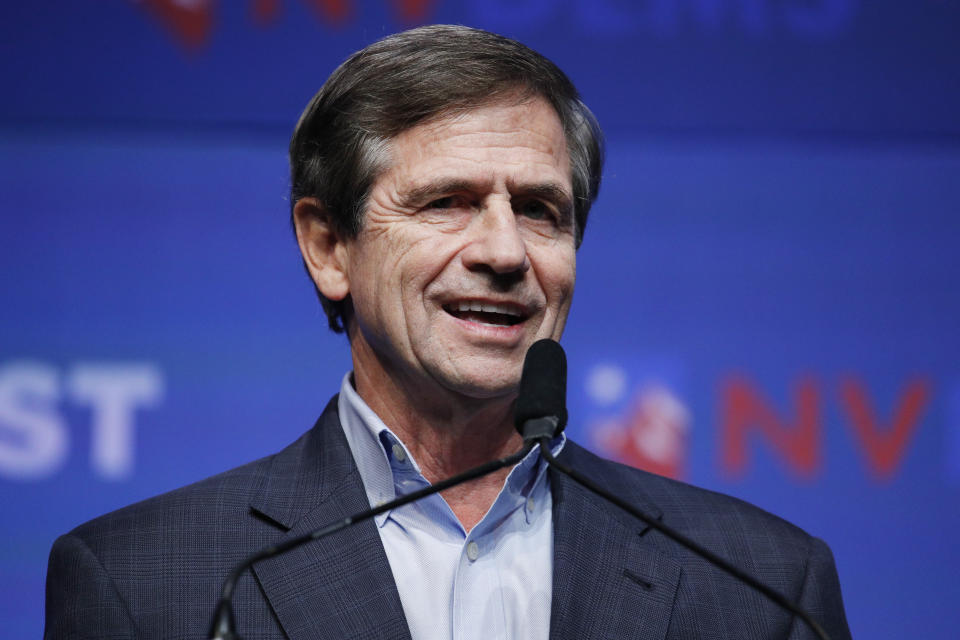
Odds of winning the nomination: n/a
National polling average: 0.3 percent (15th)
Iowa polling average: n/a
_____
Question you might hear: Who?
How to respond: Yeah, I have no idea either. [Googles “Joe Sestak.”] Looks like he was a Pennsylvania congressman.
Source of odds: PredictIt.org
Source of Trump approval ratings: FiveThirtyEight.com
Source of polling averages: RealClearPolitics.com
_____
Download the Yahoo News app to customize your experience.
Read more from Yahoo News:
Rebuilding Paradise: A year after the Camp Fire, one couple finds healing in starting over
Key Democrat: House needs to 'keep this simple' in crafting impeachment articles
As Supreme Court weighs DACA, Trump pushes fiction about 'hardened criminals'
Past and present: balloons of Macy’s Thanksgiving Day Parade




